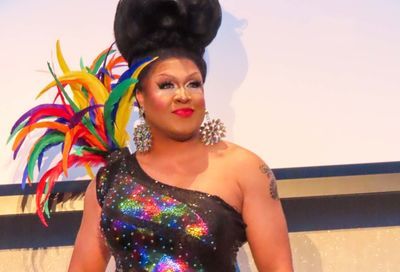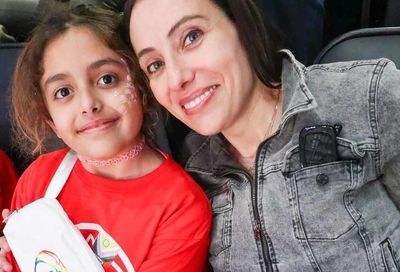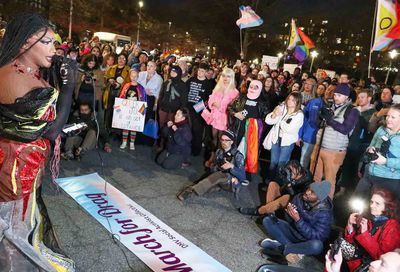Bravery in Black
Even in mourning, activists inspire the world to rally
An extraordinary display of gay courage and determination comes to us from Mukono, Uganda, thanks to a YouTube video of last Friday’s funeral for murdered gay-rights activist David Kato Kisule.
Reuters reported that the funeral “was attended by about 300 people, including about 100 members of the country’s gay community.” The gay mourners wore black shirts with Kato’s photo on the front and the liberation slogan “A luta continua” (Portuguese for “the struggle continues”) on the back.
Thus the Ugandan activists not only overcame fears of violence to attend the funeral, they stood proud. During the service, they read President Obama’s statement calling Kato a “powerful advocate for fairness and freedom.” They were determined to honor their fallen comrade. If there are braver gay people anywhere in the world, I would like to know about them.
As the video shows, one of the activists seized the microphone from a pastor engaged in an anti-gay rant. A lesbian activist stepped up to the pulpit and shouted, “We have not come to fight. You are not the judge of us.” A male activist admonished hecklers, pointed to Kato’s coffin and said, “Let David rest in peace.” When the villagers refused to bury Kato, the activists carried his coffin themselves.
Meanwhile, the West struggles to confront its role in enabling oppression. For example, Ugandan lesbian Brenda Namigadde barely won a last-minute stay of deportation from England on Jan. 28, no thanks to British Home Secretary Theresa May, who appears to have forgotten her pledge to heed credible fears of anti-gay persecution. The legitimacy of Namigadde’s asylum request was demonstrated on Jan. 25 when Uganda anti-homosexuality bill author David Bahati told Melanie Nathan of LezGetReal that Namigadde should repent or be criminally prosecuted.
Kato was pictured on the cover of the Kampala newspaper Rolling Stone in October 2010 as one of “Uganda’s Top Homos” with the slogan, “Hang Them.” But Rob Anderson reports on boston.com that Springfield, Mass., preacher Scott Lively has speculated that Kato was murdered by a gay lover. This gratuitous snipe is an obvious diversionary tactic, considering that Lively himself is accused by Ugandan activists of helping to inflame hatred in that country by participating in an anti-gay conference in Kampala in March 2009.
U.S. Global AIDS Coordinator, Ambassador Eric Goosby, who oversees the President’s Emergency Plan for AIDS Relief (PEPFAR), reacted to Kato’s death by promising, “PEPFAR will honor David’s life by continuing to provide essential HIV prevention, care and treatment to the people of Uganda — especially to vulnerable, marginalized, and most at-risk populations.” Alas, Goosby has also said that making further aid contingent on ending anti-gay persecution “would do more harm than good.” With PEPFAR implicated in the current situation by having funded viciously anti-gay Ugandan pastor Martin Ssempa during the Bush Administration, what we need is clear policy reform, not soothing rhetoric.
On Feb. 3 in D.C., Get Equal will lead a demonstration outside the Washington Hilton hotel, where the influential religious-right group The Family is holding its National Prayer Breakfast. Bahati is a member of The Family and an exemplar of its gay-hating programs. Also on Feb. 3, a rally honoring Kato will be held at Harvey Milk Plaza in San Francisco.
The enormity of injustice in the world can be overwhelming. We have to steel ourselves and do what we can. Like the Egyptian dissidents whose street protests have recently dominated the news, we possess powerful tools in Facebook, Twitter and other new media. The message you send might offer nothing but moral support, or it might help save a life or topple a dictator. The connections we make are acts of trust across a great gulf. Enough of them and we can rebuild the world.
Richard J. Rosendall is a writer and activist. He can be reached at rrosendall@starpower.net.
Support Metro Weekly’s Journalism
These are challenging times for news organizations. And yet it’s crucial we stay active and provide vital resources and information to both our local readers and the world. So won’t you please take a moment and consider supporting Metro Weekly with a membership? For as little as $5 a month, you can help ensure Metro Weekly magazine and MetroWeekly.com remain free, viable resources as we provide the best, most diverse, culturally-resonant LGBTQ coverage in both the D.C. region and around the world. Memberships come with exclusive perks and discounts, your own personal digital delivery of each week’s magazine (and an archive), access to our Member's Lounge when it launches this fall, and exclusive members-only items like Metro Weekly Membership Mugs and Tote Bags! Check out all our membership levels here and please join us today!

















